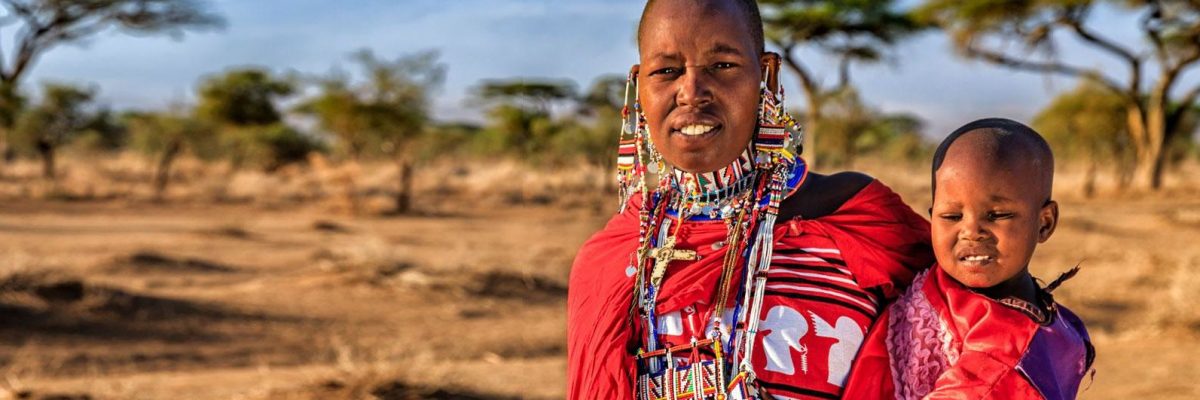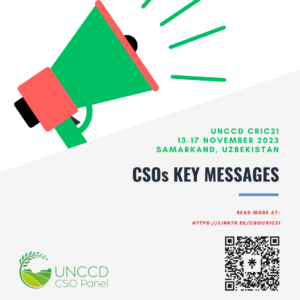CSO Synthesis Report of the Follow-up on Policy Frameworks and Thematic Issues: Gender, Drought Initiative and Land Tenure. Note by the secretariat.
Document ICCD/CRIC(19)/5) to be revised at the 19th session of the Committee for the Review of the Implementation of the Convention (CRIC).
____________________
GENDER
The COVID-19 pandemic situation further aggravated the crisis of women and girls in the world, especially in rural areas, leading more than 47 million of them to poverty, generating a setback in the progress made in equity and gender equality.
Regarding gender issues, the secretary has helped the parties to incorporate this cross-cutting issue both in the formulation of programs and projects, as well as in the plans and decisions of the COP. Significant progress has been made in the incorporation of gender mainstreaming in the measures for the Land Degradation Neutrality, through the generation of guidelines and tools, the development of three training workshops aimed at policy makers, civil society, and the private sector, there are still four regional workshops that, due to the COVID-19 pandemic situation, were not held in 2020 and which have been proposed to be held in a mixed way (virtual and face-to-face).
To strengthen support for the incorporation of the gender approach in projects, the Government of Canada will provide financial support for the Global Mechanism (GM) to provide technical support to formulators in incorporating gender issues in project interventions.
In developing of national plans against drought (NDPs) both GM and the Secretariat have provided support to 63 countries for the gender mainstreaming, of which 36 have completed the process and there are 29 NDPs published on the Convention website.
Since 2018, the incorporation of the Secretariat to the UN-SWAP, which is a unified framework for accountability on the gender perspective, has shown significant progress in meeting indicators. However, by 2020 there was still room for improvement: performance management with a gender perspective, monitoring of financial resources, allocation of financial resources and capacity assessment.
Likewise, through its social networks, the Convention has promoted and highlighted the role of women, promoting equitable access for women to land, empowerment of women, support for economic security and social justice.
The document provides the following conclusions:
- Considering the will of the Parties in the gender perspective, it is essential to create an enabling environment at the national level, where governments are key actors for the necessary changes to take place.
- Many Parties need support to develop measures that contain gender perspectives and transformative effect.
- That the secretary and the GM continue to assist the parties to continue incorporating the gender approach into internal work cycles and ensure that inequality is not perpetuated.
- UN-SWAP reporting should be considered a cornerstone in the implementation of the GAP, because it contributes to better service to the parties on gender issues.
- The Gender Assembly is an excellent instrument to raise awareness of gender issues that should continue to be organized.
The document provides the following Recommendations:
a) Strongly encourage to the parties to take advantages of the guidelines and advice related to gender provided by the Convention institutions to implement the Gender Action Plan (GAP)
b) Request the Secretariat, the GM, the institutions, and bodies of the Convention to continue to provide support and advice to Parties to help them achieve their gender – related under GAP objectives.
c) Request the Secretariat and the GM to continue improving their performance in the framework of UN-SWAP 2.0 and the fulfillment of its indicators.
d) Request the Secretariat and the GM based on budget, to continue organizing the Gender Assembly every two years, preferably at the beginning of each COP, and encourage Parties and other stakeholders to take advantage of this opportunity to support the implementation of the convention with a gender perspective.
e) Request the Secretariat, the GM and the competent institutions and bodies of the Convention to continue to carry out their work in accordance with the provisions of decision 24/COP-14.
f) Request the Secretariat and the GM to contribute to capacity building to ensure transformation and gender equality in all activities to support the implementation of the Convention.
Similarly from civil society, we consider it should urge the Secretariat and to the GM to continue accompanying the countries that are still in the process of updating or formulating the National Drought Plans (NPDs) and even update the voluntary targets of LDN targets to include gender issues, as well as targets to achieve gender equity and equality. In addition, urge Parties (countries) for which take into account and involve civil society in the contribution to the construction or updating of these plans and national voluntary goals.
DROUGHT
The drought generates costs of 80,000 million dollars annually in the world and due to climate change and more erratic rainfall it is likely that the droughts will become more intense, frequent, and severe.
The Initiative on Drought looking more resilient communities and ecosystems moving from a reactive approach (based on the crisis) to a proactive approach (based on risk management).
According to decision 29/COP13 the Secretariat and the GM they have developed technical documents, guidelines, and a technical note to facilitate national processes in the development of the NDPs. The NDPs recognize that the effects of drought vary according to gender and point to the need for greater means to mitigate the risks of drought, in addition to financial support.
In the build of the NDPs the GM supports hiring an expert national development of the plan, in addition to the technical support provided by the GM to each process.
Of 73 countries that initially expressed interest in joining the drought initiative, as of October 2020 only 64 were actively participating in the preparation of their NDP, of which 59 have completed or are about to finalize their drafts. Only 41 countries completed the whole process including the national validation of the final version of NDP. Only 29 NDPs updated are published on the website of the Convention.
The parties in its decision 23/COP14 requested the Secretariat and the GM to improve and expand the toolkit for Drought and to encourage the ability to use such instruments in relation to early warning systems and monitoring. Additions have been made to the database of available instruments.
Capacity-building workshops have been scheduled and had to be canceled due to the COVID-19 pandemic situation. These workshops were rescheduled for 2021.
Regional projects have been launched to manage drought-related risks in Central Asia and Southern Africa, with the objective of developing a regional strategic management framework and building technical and institutional capacity. The projects will be executed until the end of 2021 and have partners such as FAO, the International Institute for Water Resources Management and the World Bank.
The GM will identify possible innovative financing instruments that have a defined added value to tackle the Drought. The GM is preparing a technical report identifying the possible public and private financing instruments and mechanisms.
This document presents the following recommendations on Drought:
a) Encourage the parties to continue using the set of Instruments to mitigate the effects of the Drought.
b) Request the Secretariat, the GM, and the competent institutions to support the parties in the execution of their NDPs, offering practical training activities, subject to the availability of funding.
c) To request the Secretariat and the GM to ensure that the two regional projects for Drought risk management are executed according to their plans, and to continue providing support to other countries to develop similar projects and related activities to promote the capacity.
d) Encourage to partners and funding institutions, particularly the GEF, to support the implementation of the NDPs.
e) Encourage country Parties that have developed their NDPs to prioritize the implementation of the measures identified.
Civil society organizations consider it necessary to continue with the support provided by the Secretariat and the GM to the Parties in the preparation or updating of the NDPs and include the participation of Civil Society in these processes. Likewise, urge both parties and to the Secretariat and the GM to provide technical and financial support for the implementation of plans already drawn up, where the articulation between government, funders and civil society is key to resilience of communities and ecosystems.
LAND TENURE
Different degrees of security in land tenure influence land degradation. Contributing to security of tenure creates the motivation to invest in long-term resource conservation practices.
Land degradation is linked to uncontrolled and widespread land conversion and a lack of coordination between sectors and between stakeholders. Land tenure security can contribute to good land governance. Decision 26/COP14 provides an opportunity to accelerate the implementation of VGGT. The Secretariat was encouraged to carry out three tasks in relation to land tenure: policy, reporting and awareness-raising.
The Secretariat was requested to prepare a technical guide with FAO to integrate VGGT in the application of the Convention and the implementation of LDN, considering national contexts. The audience for the guide is policy makers and decision makers. The Secretariat and FAO began the process of participatory consultation for the preparation of the guidance in June 2020 in which participated more than 100 representatives of governments, civil society, academy, UN, and intergovernmental organizations; five countries presented findings from case studies. Other electronic consultation sessions were held to discuss the guidelines to be included in the VGGT technical guide within the framework of the LDN and finally the Secretariat and FAO ended up addressing the enabling factors, obstacles, and advantages of integrating VGGT into the implementation of the Convention and achievement of LDN. The promotion of measures that consider the gender approach to increase equal access to land for all was taken into account. Progress of technical guidance will be presented at CRIC19 and subsequently discussed at the COP 15.
The parties requested the Secretariat to study options for integrating SDG indicators relating to land governance in the reporting process of the Convention. The Secretariat is studying the available data for the indicators to determine whether it is relevant for Parties to submit information in the next reporting cycle.
The secretariat was requested to explore options to promote greater awareness of responsible governance of the Land, among vulnerable populations, including indigenous peoples and local communities. The Secretariat is collaborating with other actors to define an awareness strategy adopting a gender perspective.
Recommendations of this document include:
- Encourage the parties to continue implementing decision 26/COP14 on land tenure.
- Encourage the parties at COP15 to review the technical guide for integrating VGGT into LDN.
- Request the Secretariat and FAO to provide support in the application of the technical guide.
- Request the GM and recommend that the GEF ensure the mainstreaming of land tenure in decisions related to investment in land and in the implementation of projects to achieve LDN.






